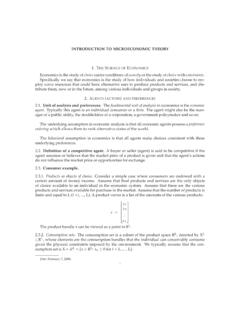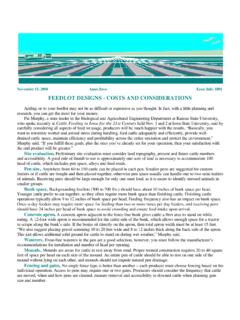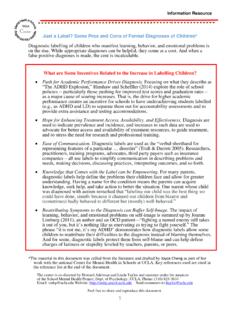Transcription of A THEORY OF JUSTICE
1 A THEORY OF JUSTICEJohn Rawls is Professor Emeritus at Harvard University. He is the author of the well-known andpath breaking A THEORY of JUSTICE (Harvard, 1971) and the more recent work Political Liberalism(Columbia, 1996). These excerpts from A THEORY of JUSTICE provide a skeletal account of Rawls'sproject of using social contract THEORY to generate principles of JUSTICE for assigning basic rightsand duties and determining the division of social benefits in a society. Rawls argues that the twoprinciples that would be reached through an agreement in an original position of fairness andequality are 1) each person is to have an equal right to the most extensive basic libertycompatible with a similar liberty for others and 2) social and economic inequalities are to bearranged so that they are both a) reasonably expected to be to everyone's advantage; and b)attached to positions and offices open to The Role of JusticeJustice is the first virtue of social institutions, as truth is of systems of thought.
2 A THEORY howeverelegant and economical must be rejected or revised if it is untrue; likewise laws and institutionsno matter how efficient and well-arranged must be reformed or abolished if they are unjust. Eachperson possesses an inviolability founded on JUSTICE that even the welfare of society as a wholecannot override. For this reason JUSTICE denies that the loss of freedom for some is made right bya greater good shared by others. It does not allow that the sacrifices imposed on a few areoutweighed by the larger sum of advantages enjoyed by many. Therefore in a just society theliberties of equal citizenship are taken as settled; the rights secured by JUSTICE are not subject topolitical bargaining or to the calculus of social interests.
3 The only thing that permits us toacquiesce in an erroneous THEORY is the lack of a better one; analogously, an injustice is tolerableonly when it is necessary to avoid an even greater injustice. Being first virtues of humanactivities, truth and JUSTICE are uncompromising. These propositions seem to express our intuitiveconviction of the primacy of JUSTICE . No doubt they are expressed too strongly. In any event Iwish to inquire whether these contentions or others similar to them are sound, and if so how theycan be accounted for. To this end it is necessary to work out a THEORY of JUSTICE in the light ofwhich these assertions can be interpreted and The Subject of JusticeMany different kinds of things are said to be just and unjust: not only laws, institutions, andsocial systems, but also particular actions of many kinds, including decisions, judgments, andimputations.
4 We also call the attitudes and dispositions of persons, and persons themselves, justand unjust. Our topic, however, is that of social JUSTICE . For us the primary subject of JUSTICE isthe basic structure of society, or more exactly, the way in which the major social institutionsdistribute fundamental rights and duties and determine the division of advantages from socialcooperation. By major institutions I understand the political constitution and the principaleconomic and social arrangements. Thus the legal protection of freedom of thought and liberty ofconscience, competitive markets, private property in the means of production, and themonogamous family are examples of major social institutions. Taken together as one scheme, themajor institutions define men's rights and duties and influence their life-prospects, what they canexpect to be and how well they can hope to do.
5 The basic structure is the primary subject ofjustice because its effects are so profound and present from the start. The intuitive notion here isthat this structure contains various social positions and that men born into different positionshave different expectations of life determined, in part, by the political system as well as byeconomic and social circumstances. In this way the institutions of society favor certain startingplaces over others. These are especially deep inequalities. Not only are they pervasive, but theyaffect men's initial chances in life; yet they cannot possibly be justified by an appeal to thenotions of merit or desert. It is these inequalities, presumably inevitable in the basic structure ofany society to which the principles of social JUSTICE must in the first instance apply.
6 Theseprinciples, then, regulate the choice of a political constitution and the main elements of theeconomic and social system. The JUSTICE of a social scheme depends essentially on howfundamental rights and duties are assigned and on the economic opportunities and socialconditions in the various sectors of society ..3. The Main Idea of The THEORY of JusticeMy aim is to present a conception of JUSTICE which generalizes and carries to a higher level ofabstraction the familiar THEORY of the social contract as found, say, in Locke, Rousseau, and Kant. In order to do this we are not to think of the original contract as one to enter a particular societyor to set up a particular form of government. Rather, the guiding idea is that the principles ofjustice for the basic structure of society are the object of the original agreement.
7 They are theprinciples that free and rational persons concerned to further their own interests would accept inan initial position of equality as defining the fundamental terms of their association. Theseprinciples are to regulate all further agreements; they specify the kinds of social cooperation thatcan be entered into and the forms of government that can be established. This way of regardingthe principles of JUSTICE I shall call JUSTICE as fairness. Thus we are to imagine that those whoengage in social cooperation choose together, in one joint act, the principles which are to assignbasic rights and duties and to determine the division of social benefits. Men are to decide inadvance how they are to regulate their claims against one another and what is to be thefoundation charter of their society.
8 just as each person must decide by rational reflection whatconstitutes his good, that is, the system of ends which it is rational for him to pursue, so a groupof persons must decide once and for all what is to count among them as just and unjust. Thechoice which rational men would make in this hypothetical situation of equal liberty, assumingfor the present that this choice problem has a solution, determines the principles of as fairness the original position of equality corresponds to the state of nature in thetraditional THEORY of the social contract. This original position is not, of course, thought of as anactual historical state of affairs, much less as a primitive condition of culture. It is understood asa purely hypothetical situation characterized so as to lead to a certain conception of JUSTICE ?
9 Among the essential features of this situation is that no one knows his place in society, his classposition or social status, nor does anyone know his fortune in the distribution of natural assetsand abilities, his intelligence, strength, and the like. I shall even assume that the parties do notknow their conceptions of the good or their special psychological propensities. The principles ofjustice are chosen behind a veil of ignorance. This ensures that no one is advantaged ordisadvantaged in the choice of principles by the outcome of natural chance or the contingency ofsocial circumstances. Since all are similarly situated and no one is able to design principles tofavor his particular condition, the principles of JUSTICE are the result of a fair agreement orbargain.
10 For given the circumstances of the original position, the symmetry of everyone's relationto each other, this initial situation is fair between individuals as moral persons, that is, as rationalbeings with their own ends and capable, I shall assume, of a sense of JUSTICE . The originalposition is, one might say, the appropriate initial status quo, and the fundamental agreementsreached in it are fair. This explains the propriety of the name " JUSTICE as fairness": it conveys theidea that the principles of JUSTICE are agreed to in an initial situation that is fair. The name doesnot mean that the concepts of JUSTICE and fairness are the same, any more that the phrase "poetryas metaphor" means that the concepts of poetry and metaphor are the same.










